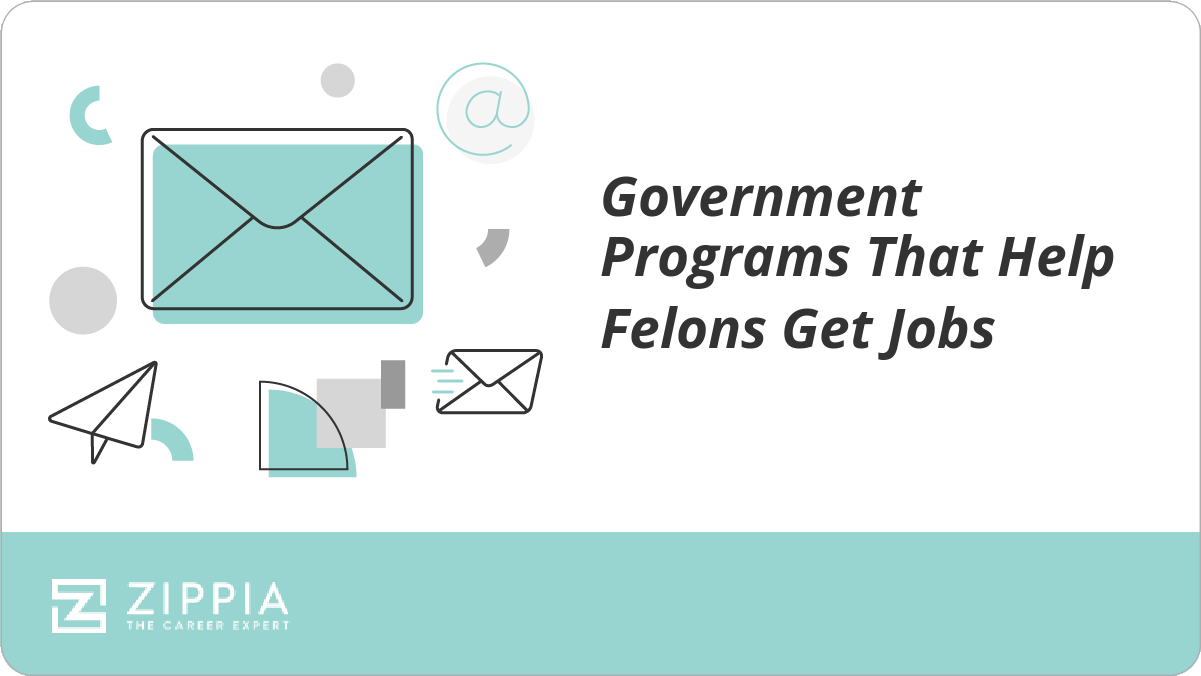- Application
- Email Communication
- Letter Communication
- Follow Up
- Job Application Tips
- About Me Page
- Answering Machine Messages
- What To Bring To A Job Fair
- Free Job Posting Sites
- Email Sign Offs
- Job Scams
- How Long Does It Take To Become A Doctor
- How Long Does It Take To Become A Vet
- Government Programs That Help Felons Get Jobs
- How Long Does It Take To Become A Dentist
- Relocation
- Job Search Spreadsheet
- Right To Work States
- How To Research A Company
- How To Change Careers
- What To Do If You Have No References
- Working For a Big Company Vs. A Small Company
- Writing Sample Format
- How Long Should A Writing Sample Be
- How To Get A Job Fast
- How Many Jobs Should I Apply For
- Military Requirements
Find a Job You Really Want In
In the United States, there are roughly 24 million people who have a felony on their criminal record. The mark of a felony has many negative repercussions on a person’s life, and one of the biggest challenges for re-entry is landing a job.
Despite the struggle to reenter the workforce after being incarcerated, it is a very possible and realistic goal that can lead to a fulfilling, long-term career. In this article, we’ll talk about a variety of programs that help felons get hired, as well as some companies that regularly hire felons.
Key Takeaways
-
Federal employer incentive programs such as the work opportunity tax credit and the federal bonding program encourage employers to hire felons.
-
Individual organizations that provide resources for felons looking for jobs include Help for Felons, Jobs for Felons Hub, and HireFelons.org.
-
The Fair Chance Business Pledge and Ban the Box are initiatives that work to make it easier for felons to get hired based on merit.

Federal Employer Incentive Programs
Although it can feel helpless to search for a job with a felony on your record, there are options to aid you in this process.
Here are a few of the government programs that help felons get jobs:
-
The work opportunity tax credit. The work opportunity tax credit is a government program that aims to lend a helping hand to marginalized job-seekers by giving employers who hire them a tax credit. The tax credit can be up to $9,600 per employee who meets the work opportunity requirements.
The tax credit is provided for hiring people from particular groups, such as ex-felons, veterans, and individuals receiving government assistance. These groups are focused on because they each have significant challenges standing in the way of obtaining a job.
For the employer to receive the tax credit incentive, the ex-offender must be hired as an employee by the time they complete their probation and parole or within a year of being released from prison.
-
The federal bonding program. This federal assistance program works by establishing agreed-upon insurance protection for employers when they hire individuals who could be considered risky.
This helps find ex-felons, addicts, and people who haven’t had much work experience negotiate a place as an employee because it lessens the risk that they’ll cause harm to the business.
The federal bonding program insures the business for up to $5,000 in damages for hiring an employee who comes from a risky background. In certain situations, reparations of up to $25,000 are supplied if requested by the employer. This insurance is provided at no cost to the employee or their employer.
The federally provided insurance lasts for six months, at which point the employee continues work uninsured or the employer pays for extra months of insurance.
Individual Organizations Providing Support For Felons
In addition to the government, there are many private organizations that help felons find work as well, including Help for Felons, Jobs for Felons Hub, and HireFelons.org.
-
HelpforFelons.org. Help for Felons is a website that provides a wealth of knowledge and support for individuals who have recently been released from prison. Their mission is to provide help to ex-offenders with assistance in all aspects of re-entry back into society.
A lot of the resources on Help for Felons involves employment opportunities. This includes a job search tool that only shows felon-friendly options and lists the best career paths for individuals with a criminal background.
In addition to career assistance and advice, Help for Felons also provides help in other hurdles they will likely face.
This includes:
-
Felon-friendly housing resources
-
Food stamp information
-
Book recommendations for newly released felons
-
Loans and grants for felons
-
Legal information
-
-
JobsforFelonsHub.com. This organization provides similar help and resources that Help for Felons does, including a job board that posts felon-friendly jobs, housing, and legal information. However, it also presents additional information for employers interested in hiring a felon to work on their team.
The Jobs for Felons Hub website features a blog that provides useful information for ex-convicts looking for employment. The topics covered mostly include articles about larger employers and whether they hire felons or not.
If you’re interested in working with a specific retailer, such as Staples or Petco, their blog posts have a lot of information about their felon acceptance and other aspects of the hiring process.
-
HireFelons.org. Another option for a website that supplies extensive research and resources to help ex-convicts transition into a lucrative career is HireFelons.org. Once again, this website provides many similar tools to the two previous, but it also has some unique added elements.
The HireFelons.org blog is extensive. It has more resources than most people would know what to do with. Their articles cover broad topics such as “200+ companies that hire felons in 2020” to more niche focuses like, “How far back do background checks go?”. A lot of the information they provide is an interesting read for anyone and is especially helpful for felons.
Unlike some of the other resources, HireFelons.org also supplies educational support. A lot of their blog articles involve school and study-related topics. If you’re a felon who is curious about what options they have to go back to school, this is an excellent resource.
Movements to Help Felons Get Jobs
These initiatives have been effective at encouraging companies to hire felons, and some states have even adopted them into their employment laws.
-
Fair Chance Business Pledge. Though a fairly new concept proposed in 2016 under the Obama-administration, the Fair Chance Business Pledge has done a lot of good for ex-felons in need of jobs.
The pledge was initially put forth in an effort to supply second chances to Americans who need them, such as ex-offenders. It’s given weight to the concept of reformation by allowing inmates to leave prison and still have a chance at a career.
It is a pledge that employers sign and take on to hire employees based on merit and not exclude applicants because of a criminal record. They agree to give any job applicant equal consideration regardless of background. In signing this pledge, the employers agree to treat employees who are ex-convicts the same way they would with any other employ.
Once signing the Fair Chance Business Pledge, the company is added to a running list of other businesses who agreed to uphold the same behavior. The Fair Chance Business Pledge was created with the knowledge in mind that upwards of 70 million Americans have some sort of criminal record that makes it more difficult for them to get jobs, and they deserve a second chance.
Requirements for employers signing the pledge include:
-
Promoting Fair Chance business practices (Delaying criminal history questions until the end of the hiring process, using accurate background checking systems, hosting Fair Chance job fairs, etc.)
-
Taking Action in the Community (Providing work supplies for individuals in need, supporting reentry programs, mentoring children with parents in prison)
-
-
Ban the Box. This initiative is named after its goal of removing the checkbox asking applicants if they have a criminal record from job applications. When companies do this, it gives candidates a fair shot at earning a job based on merit rather than immediately disqualifying them based on their criminal records.
This initiative also limits when in the hiring process companies can ask about candidates’ criminal records and how far back in time their queries can go.
Over 35 states and 150 cities and counties have adopted this hiring policy.
Examples of Businesses that Hire Felons in 2020
It’s overwhelming to go through all the programs and resources that could land you a job as a felon. Sometimes it’s more beneficial and easier to go straight to the source of companies that actively hire individuals with criminal records, either by signing the Fair Chance Business Pledge, or speaking candidly about the matter.
Below are twenty companies that are open to hiring felons in 2020:
Tips for Felons Looking for a Job
-
Do research. The key to any successful job search is using research to your benefit. More information is available for free online about the hiring process, felon resources, and statewide job data than anyone could read in a single lifetime.
Take advantage of the resources available to make yourself the best possible candidate for a job opening.
-
Be honest in the application process. It’s always important to be honest when you’re applying and interviewing for a job. However, this is crucial for ex-convicts looking for work because there are already negative presumptions that hinder their job-search efforts.
If an employer finds out that you’ve been untruthful in your application or interview, there’s no way that they’ll look past a criminal background and hire you.
Even though it’s intimidating to tell a potential employer that you have a felony on your record, it’s necessary to being perceived as an applicant with integrity and taking a step in a positive direction.
-
Consider going back to school. Having a degree or certification in a particular skill only helps your chances of landing a job. It makes you a more competitive candidate, and your resume stands out due to your qualifications.
While going back to school to pursue a career after incarceration isn’t an option for everyone, you may be surprised to find how many educational opportunities there are for individuals in this situation.
-
Apply to many positions. While the general advice for applying to jobs is to be picky and only send a resume to positions that completely match your ideal position, this isn’t effective for a person with a criminal record.
Instead, try to get an application out to as many positions as possible to improve your odds of hearing back. It’s always better to have more options when you’re looking for a professional position as a felon.
-
Have a positive attitude. Perhaps the best piece of advice to take in as an ex-offender looking for a job is to maintain a positive attitude. Although the process towards reentry and attaining a paid position can be bleak at times, there’s something worth working towards. Stick with it and remember that there’s a job opportunity out there for you.
Government Programs That Help Felons Get Jobs FAQ
-
What government jobs can felons get?
Felons can get most government jobs that don’t deal with firearms or require a security clearance. Felons are banned from handling or working with firearms and ammunition, so government jobs that deal with these are off the table.
Positions that require a security clearance require a clean background check, so felons are automatically disqualified from those as well.
Outside of these restrictions, felons can apply for any government job they want to and can often get entry-level positions with relative ease, especially if they don’t involve working directly with the public.
For example, the government needs plenty of drivers, warehouse workers, clerks, administrative assistants, and maintenance technicians in almost all its locations and branches, and felons can often fill these roles.
Some felons can’t work for the government at all. Those who commit treason, for example, are banned from ever working for the federal government, and some have to wait for a certain amount of time before they can apply for a government job.
In addition, felons have to pass a suitability check to work for the government. This investigates whether or not they have shown upstanding character and conduct recently, where they’re at in their rehabilitation process, and whether or not the crimes they were convicted of conflict with the type of job they’re applying for.
-
What is the best way to get a job with a felony?
The best way to get a job with a felony is to do thorough research and apply to as many positions as possible. There are many programs and companies that make it possible for felons to get jobs. It just might take some digging to find them.
Once you do, it’s a good idea to apply for as many positions as possible. Even if you aren’t perfectly qualified or they aren’t your dream job, the most important thing is to get your foot in the door and begin building some solid work experience so that then you can try to move into a job that you are excited about.
It may be tempting to stretch the truth about your qualifications or downplay your past, but resist that temptation when you are applying. Being truthful only runs the risk of missing out on a job opportunity, but lying will guarantee it.
If you lie even a little, you’ll be found out at some point, and when you are, you’ll be immediately discounted as a candidate (or fired, if you somehow got hired). Worse, you’ll likely miss out on future job opportunities because you’ll have to explain what went wrong to future hiring managers if someone else didn’t already.
If you don’t get a job right away because of your history and qualifications, just keep working at it, putting your best foot forward while still being truthful.
-
Can you get a federal job with a felony?
You can get a federal job with a felony. Like any job, though, you’ll have to show that they have been and are going to work hard and have the skills required for the job.
In addition, even though you won’t be asked about your criminal history until further into the job application process, you will have to explain your conviction and your efforts toward rehabilitation before you can officially be hired.
This is a part of the background check process, and hiring officials won’t necessarily immediately discount you based on your past criminal activity, but they will have to take into account whether or not your past crimes conflict with the position you’re applying for.
For example, if someone was convicted of a financial crime, the government will be less likely to hire them for a position as treasurer. That doesn’t mean that they can’t get a job in a different governmental role, though. It just depends on the individual and the situation.
There are some restrictions on felons working in government to be aware of as you apply for positions. For example, some laws keep felons from working in government for a certain number of years.
Similarly, felons who have committed treason are permanently banned from working in the federal government, and people convicted of a misdemeanor or felony are prohibited from working with firearms or ammunition in any way. In addition, some positions that deal with national security can’t hire felons.
Before you take the time to apply for a federal job, make sure you’re aware of these restrictions and whether or not they apply to you.
-
Are there any grants for felons?
Yes, there are grants for felons. Felons qualify for a variety of grants from both government programs and privately run organizations.
If a felon wants to start a business, go back to school, or conduct social or scientific research, they can apply for grants just like anyone else can. Some organizations like Inmates to Entrepreneurs specifically work with people with criminal records to help them start businesses, while others are available to anyone, felon or not.
Local, state, and federal governments offer grants like this, and private funding platforms such as Kickstarter and GoFundMe provide opportunities to anyone to raise money. Other programs such as PELL Grants for Education have specific programs for felons and inmates, so check into those as well.
When raising funds or applying for a grant of any kind for a business you’re starting, it’s important to make sure your idea or proposal is as solid as possible. Show funders that you know what you’re talking about and that you’ve already put in the work with the money you do have.
The grant application process can also be complicated, so be sure to do thorough research or ask someone with more experience for help making sure you meet all of the application requirements.
Far more people apply for grants than can receive money, so organizations seek reasons to disqualify applicants. To avoid being discounted on a technicality, make sure you read all of the application instructions extremely carefully and follow them to the letter.
-
Yes, felons can get SBA grants. The U.S. Small Business Administration offers several grants and small business loans, disaster assistance, and investment capital that felons can receive.
There aren’t programs specifically designed for felons, but felons are allowed to apply the same as anyone else, and a criminal record won’t prevent you from getting a grant.
The SBA grants can’t be used to start or expand a business, but they can be used for other small business expenses such as COVID-19 relief, exporting, and research and development. In addition, the SBA offers funding for certain types of organizations that support and assist entrepreneurs and small business owners.
This grant program, like many others, is complex, so carve out a good amount of time to do your research before you apply. There are even online guides to help you sort through all of the criteria and gather what you need to present to the SBA to be considered.
The goal of the SBA is to help out organizations that are adding to and strengthening the economy, so once you get your business or organization up and running, one of these grants could be a great way to keep it going.
- Application
- Email Communication
- Letter Communication
- Follow Up
- Job Application Tips
- About Me Page
- Answering Machine Messages
- What To Bring To A Job Fair
- Free Job Posting Sites
- Email Sign Offs
- Job Scams
- How Long Does It Take To Become A Doctor
- How Long Does It Take To Become A Vet
- Government Programs That Help Felons Get Jobs
- How Long Does It Take To Become A Dentist
- Relocation
- Job Search Spreadsheet
- Right To Work States
- How To Research A Company
- How To Change Careers
- What To Do If You Have No References
- Working For a Big Company Vs. A Small Company
- Writing Sample Format
- How Long Should A Writing Sample Be
- How To Get A Job Fast
- How Many Jobs Should I Apply For
- Military Requirements





